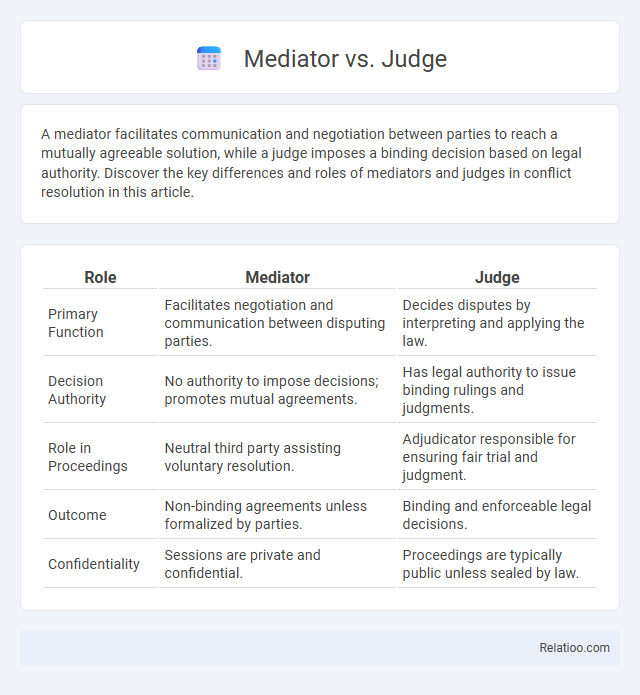A mediator facilitates communication and negotiation between parties to reach a mutually agreeable solution, while a judge imposes a binding decision based on legal authority. Discover the key differences and roles of mediators and judges in conflict resolution in this article.
Table of Comparison
| Role | Mediator | Judge |
|---|---|---|
| Primary Function | Facilitates negotiation and communication between disputing parties. | Decides disputes by interpreting and applying the law. |
| Decision Authority | No authority to impose decisions; promotes mutual agreements. | Has legal authority to issue binding rulings and judgments. |
| Role in Proceedings | Neutral third party assisting voluntary resolution. | Adjudicator responsible for ensuring fair trial and judgment. |
| Outcome | Non-binding agreements unless formalized by parties. | Binding and enforceable legal decisions. |
| Confidentiality | Sessions are private and confidential. | Proceedings are typically public unless sealed by law. |
Understanding the Roles: Mediator vs Judge
Understanding the roles of a mediator vs judge involves recognizing that a mediator facilitates communication and negotiation between disputing parties to reach a mutually agreeable solution, while a judge evaluates evidence and delivers a legally binding decision based on laws and court procedures. Your participation in mediation allows for more control over the outcome, fostering collaboration and preserving relationships, whereas a judge's decision is final and enforceable by law but may limit your input in the resolution process. Choosing between mediation and litigation depends on the desired level of involvement, confidentiality, and the importance of having a legally binding ruling.
Core Differences Between Mediation and Judicial Proceedings
Mediation involves a neutral third party facilitating communication and negotiation between disputing parties to reach a voluntary resolution, emphasizing collaboration and confidentiality. Judicial proceedings are formal, court-supervised processes where a judge evaluates evidence and enforces legally binding decisions based on law and procedure. Unlike judges who impose outcomes, mediators promote self-determination, flexibility, and faster dispute resolution without the rigidity of courtroom rules.
Key Responsibilities of a Mediator
A mediator facilitates communication between disputing parties to help them reach a voluntary, mutually acceptable agreement without imposing a decision. Unlike a judge, who evaluates evidence and issues binding rulings, or an arbitrator, who makes decisions after hearing both sides, a mediator's key responsibility is to guide dialogue and encourage collaboration. Understanding these distinct roles can help you choose the best dispute resolution method for your specific needs.
Judicial Authority: Powers and Duties of a Judge
A judge holds judicial authority with the power to interpret laws, adjudicate disputes, and enforce court orders, ensuring legal compliance and maintaining public order. Unlike mediators who facilitate negotiation without imposing decisions, judges have the duty to deliver legally binding judgments based on evidence and legal principles. This authority includes issuing warrants, sentencing offenders, and overseeing courtroom procedures to uphold justice within the judicial system.
Process Comparison: Mediation vs Court Trials
Mediation offers a collaborative process where a neutral mediator facilitates communication between parties to reach a mutually acceptable agreement, emphasizing confidentiality and flexibility. Court trials, led by a judge, follow formal procedures with evidence presentation, legal rules, and a binding judgment imposed on the parties. Your choice between mediation and court trials depends on whether you seek a faster, cost-effective resolution or a definitive legal ruling enforced by the judicial system.
Decision-Making: Collaborative vs Authoritative Approaches
Mediators facilitate a collaborative decision-making process by guiding parties to reach a mutually acceptable agreement, emphasizing communication and understanding. Judges, on the other hand, exercise authoritative decision-making by evaluating evidence and legal arguments to deliver a binding ruling. Your choice between a mediator and a judge influences whether the resolution is driven by consensus or legal authority, impacting control, flexibility, and outcome enforceability.
Confidentiality and Privacy in Mediation and Court
Confidentiality in mediation is legally protected, ensuring that You can speak freely without fear of your statements being used against You in court, unlike judge-led proceedings where records are public and accessible. Mediators facilitate private, off-the-record discussions, fostering open communication, whereas judges make binding decisions in a transparent courtroom environment subject to public scrutiny. Privacy in mediation supports collaborative resolutions, protecting sensitive information, while court hearings often involve formal disclosures and public record-keeping.
Time, Cost, and Efficiency: Mediation vs Litigation
Mediation typically resolves disputes faster than litigation, often concluding within weeks, whereas court cases can extend for months or years, significantly increasing time investment. Cost-wise, mediation is more affordable by eliminating extensive legal fees and court costs, while litigation involves higher expenses due to prolonged procedures and attorney hours. Efficiency in mediation stems from its flexible, collaborative process leading to mutually acceptable solutions, contrasting with the rigid, adversarial nature of judges' decisions that may prolong resolution and increase emotional strain.
Suitability: When to Choose a Mediator or a Judge
Mediators excel in resolving disputes through voluntary, confidential negotiation, making them ideal for situations requiring flexible, collaborative solutions without formal legal rulings. Judges are suitable when parties need binding decisions enforceable by law, especially in cases involving complex legal questions or when negotiation fails. Choosing between a mediator and a judge depends on the dispute's nature, the desired outcome, and whether confidentiality or formal adjudication is prioritized.
Impact on Relationships: Mediated Solutions vs Judicial Rulings
Mediated solutions foster collaborative communication and mutual understanding, often preserving or improving relationships by emphasizing compromise and tailored agreements. Judicial rulings, determined by judges, impose legally binding decisions that can create winners and losers, potentially leading to lingering resentment or damaged relationships. Mediation promotes longer-lasting relational harmony through voluntary participation and flexibility, whereas judicial outcomes may prioritize legal correctness over relational considerations.

Infographic: Mediator vs Judge
 relatioo.com
relatioo.com